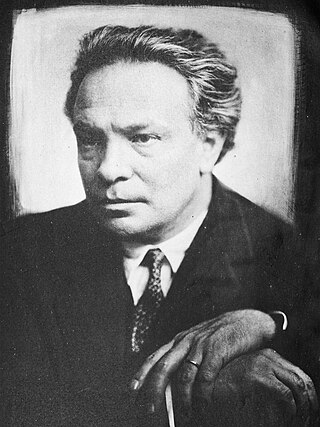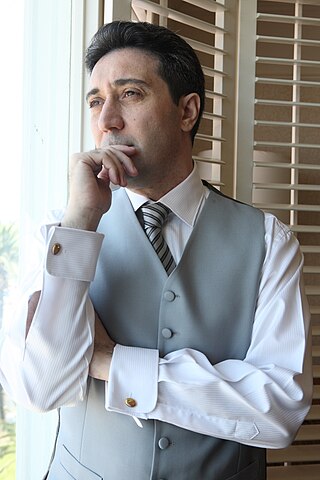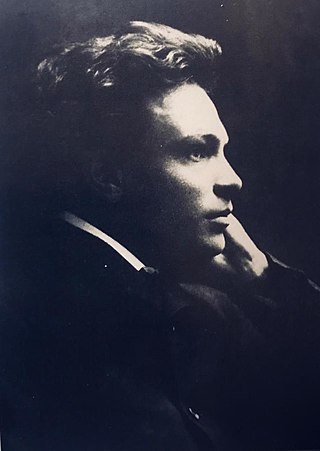Overture Respighiana is an overture composed by Salvatore Di Vittorio in 2008, as an homage to Ottorino Respighi, one year after completing Respighi's rediscovered first Violin Concerto in A Major .
Overture Respighiana is an overture composed by Salvatore Di Vittorio in 2008, as an homage to Ottorino Respighi, one year after completing Respighi's rediscovered first Violin Concerto in A Major .
The overture is scored for two flutes (II Piccolo), two oboes (II English horn), two clarinets in A, two bassoons, two horns in F, two trumpets, three trombones, one tuba, timpani, three percussion (triangle, antique cymbals, glockenspiel, snare drum, tambourine, cymbals, bass drum, and tam tam), celesta, harp, and strings.
Duration is approximately seven minutes.
The overture was composed as an homage not only to Ottorino Respighi, but Respighi's homage works on Gioachino Rossini ( La Boutique fantasque and Rossiniana ).
The beginning of the overture captures the orchestral sounds of the introduction of Pines of Rome , though with new melodies, simultaneously citing elements of Respighi's Rossiniana. Through fanfares, the music leads to a variation of the March from La Boutique fantasque. A brief sarabande styled interlude is given, inspired from the Valse Lente movement of La Boutique fantasque. The final section involves a tarantella dance in the style of Rossini, which ends with a rocket crescendo.
The overture demonstrates Respighi's influence on Di Vittorio, also through Rossini's influence on the music of Respighi.
The overture received its world premiere from the Chamber Orchestra of New York under the composer, on February 13, 2010, at the Church of St. Jean Baptiste in New York. It was recorded for Naxos Records.
This work was published in 2008 by Edizioni Panastudio in Italy.

The cor anglais, or English horn, is a double-reed woodwind instrument in the oboe family. It is approximately one and a half times the length of an oboe, making it essentially an alto oboe in F.

Ottorino Respighi was an Italian composer, violinist, teacher, and musicologist and one of the leading Italian composers of the early 20th century. His compositions range over operas, ballets, orchestral suites, choral songs, chamber music, and transcriptions of Italian compositions of the 16th–18th centuries, but his best known and most performed works are his three orchestral tone poems which brought him international fame: Fountains of Rome (1916), Pines of Rome (1924), and Roman Festivals (1928).
Roman Festivals, P 157 is a tone poem in four movements for orchestra completed in 1928 by the Italian composer Ottorino Respighi. It is the last of his three tone poems about Rome, following Fountains of Rome (1916) and Pines of Rome (1924), which he referred to as a triptych. Each movement depicts a scene of celebration in ancient and contemporary Rome, specifically gladiators battling to the death, the Christian Jubilee, a harvest and hunt festival, and a festival in the Piazza Navona. Musically, the piece is the longest and most demanding of Respighi's Roman trilogy.
Pines of Rome, P 141, is a tone poem in four movements for orchestra completed in 1924 by the Italian composer Ottorino Respighi. It is the second of his three tone poems about Rome, following Fontane di Roma (1916) and preceding Feste Romane (1928). Each movement depicts a setting in the city with pine trees, specifically those in the Villa Borghese gardens, near a catacomb, on the Janiculum Hill, and along the Appian Way. The premiere was held at the Teatro Augusteo in Rome on 14 December 1924, with Bernardino Molinari conducting the Augusteo Orchestra, and the piece was published by Casa Ricordi in 1925.

La campana sommersa is an opera in four acts by Italian composer Ottorino Respighi. Its libretto is by Claudio Guastalla, based on the play Die versunkene Glocke by German author Gerhart Hauptmann. The opera's premiere was on 18 November 1927 in Hamburg, Germany. Respighi's regular publisher, Ricordi, was displeased by his choice of subject, and refused to publish the opera. This led to its being published by the German publisher Bote & Bock, and a German premiere.
Péchés de vieillesse is a collection of 150 vocal, chamber and solo piano pieces by composer Gioachino Rossini, who was best known for his operas. The pieces are grouped into fourteen unpublished albums under this self-deprecating and ironic title. The ordering of the pieces in the albums does not reflect the sequence or the dates of their composition, which range from 1857 to shortly before Rossini's death in 1868. The title Péchés de vieillesse was given by Rossini only to volumes V to IX but has been applied to all. The collection is salon music, though of a refined order, meant to be performed in the privacy of Rossini's drawing room at Passy. Volumes I, II, III and XI are vocal music to piano accompaniment. Volumes IV, V, VI, VII, VIII, X and XII are music for solo piano. Volume IX is for chamber ensemble or solo piano. Volumes XIII and XIV comprise vocal and non-vocal music.
"La danza" (Dance) (1835) is a patter song by Gioachino Rossini, in Tarantella napoletana time, the eighth song of the collection Les soirées musicales (1830–1835). The lyrics are by Count Carlo Pepoli, librettist of Vincenzo Bellini's opera I puritani. "La danza" is a stand-alone chamber vocal piece, rather than part of a larger work.
La Boutique fantasque, also known as The Magic Toyshop or The Fantastic Toyshop, is a ballet in one act conceived by Léonide Massine, who devised the choreography for a libretto written with the artist André Derain, a pioneer of Fauvism. Derain also designed the décor and costumes for the ballet. Ottorino Respighi wrote the music based on piano pieces by Gioachino Rossini. Its world premiere was at the Alhambra Theatre in London on 5 June 1919, performed by Sergei Diaghilev's Ballets Russes.
Belfagor is an Italian-language opera by the composer Ottorino Respighi to a libretto by Claudio Guastalla (1880–1948) based on the comedy Belfagor of Ercole Luigi Morselli (1882–1921), itself loosely based on the novella Belfagor arcidiavolo by Niccolò Machiavelli. It was premiered in 1923 at La Scala in Milan, under the baton of Antonio Guarnieri, since Toscanini was unavailable. The cast featured Irish soprano Margaret Burke Sheridan as Candida, baritone Mariano Stabile as her lover Baldo, and tenor Francesco Merli as the titular Belfagor, an arcidiavolo (Archdemon) who tries to marry a human maiden while in disguise as a nobleman, using gifts of money to her father.

Alberto Zedda was an Italian conductor and musicologist whose specialty was the 19th-century Italian repertoire.

Marzio Conti is an Italian conductor and flautist.

Salvatore Di Vittorio is an Italian composer and conductor. He is the music director and conductor of the Chamber Orchestra of New York. He has been recognized by Luigi Verdi as a "lyrical musical spirit, respectful of the ancient Italian tradition... an emerging leading interpreter of the music of Ottorino Respighi".
Rossiniana, P. 148, is a 1925 orchestral suite by Ottorino Respighi, based on four piano pieces by Gioachino Rossini.
The Violin Concerto in A major, P. 49, is the first violin concerto by the Italian composer Ottorino Respighi, which he abandoned in 1903. In 2009, Salvatore Di Vittorio completed it.
Chamber Orchestra of New York is a professional orchestra founded as Chamber Orchestra of New York - Ottorino Respighi by the Italian composer and conductor Salvatore Di Vittorio. It was established on March 27, 2006, on the 250th anniversary of the birth of Wolfgang Amadeus Mozart, with its debut concert on October 11, 2007 at Carnegie Hall's Zankel Hall as part of the inaugural 2007/2008 Season.

Lucrezia is an opera in one act and three tableaux by Ottorino Respighi to a libretto by Claudio Guastalla, after Livy and William Shakespeare's The Rape of Lucrece, itself based heavily on Ovid's Fasti. Respighi died before finishing the work, which was therefore completed by his wife, Elsa Respighi, and by one of his pupils, Ennio Porrino. Lucrezia premiered on 24 February 1937 at the Teatro alla Scala in Milan, in a production directed by Mario Frigerio with sets designed by Pietro Aschieri. The première had a good reception.

Semirâma is an opera in three acts by Ottorino Respighi to a libretto by Alessandro Cerè based on Voltaire's 1748 play Sémiramis, the same subject used for Rossini's Semiramide. Semirâma premiered on 20 November 1910 at the Teatro Comunale di Bologna. The première obtained a great success, with several calls for the composer and the singers.

La bella dormente nel bosco is an opera in three acts by Ottorino Respighi to a libretto by Gian Bistolfi based on Charles Perrault's fairy tale "Sleeping Beauty".
Irene Abrigo is an Italian classical violinist.
The Anniversaries are a series of short compositions of easy difficulty for solo piano by American composer Leonard Bernstein. These compositions were written over the course of forty years as gifts for people Bernstein was acquainted or friends with on the occasion of their birthday. The published series comprises the following works: